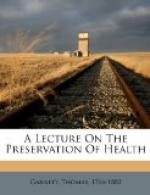Let us next consider the matter of heat: suppose water to be heated lukewarm, if you put one hand into it, it will feel warm; if you now put the other hand into water, heated for instance to 120 degrees or 130 degrees, and keep it there some time, we will say, two minutes; if then you take it out, and put it into the lukewarm water, that water will feel cold, though still it will seem warm to the other hand; for, the hand which had been in the heated water, has had its excitability exhausted by the application of heat. Before you go into a warm bath, the temperature of the air may seem warm and agreeable to you, but after you have remained for some time in a bath that is rather hot, when you come out, you feel the air uncommonly cool and chilling.
Let us now examine the effects of substances taken into the stomach; and as the effects of spirituous, and vinous liquors, are a little more remarkable than food, we shall make our observations upon them.
A person who is unaccustomed to drink these liquors, will be intoxicated by a quantity that will produce no effect upon one who has been for some time accustomed to take them; and when a person has used himself to these stimulants for some time, the ordinary powers which in common support life, will not have their proper effects upon him, because his excitability has been in some measure exhausted by the stimulants.
The same holds good with respect to tobacco and opium; a person accustomed to take opium will not be affected by a quantity that would completely intoxicate one not used to it; because the excitability has been so far exhausted by the use of that drug, that it cannot be acted on by a small quantity.
These facts, with innumerable others, which will easily suggest themselves to you, prove the truth of our second proposition, namely, that when the exciting powers have acted violently, or for a considerable time, the excitability is exhausted, or less fit to be acted on.
This exhaustion of the excitability, may, however, be either finite, or temporary; we see animals, while the exciting powers continue to act, at first appear in their greatest vigour, then gradually decay, and at last come into that state, in which, from the long continued action of the exciting powers, the excitability is entirely exhausted, and death takes place.
We likewise see plants in the spring, while the exciting powers have acted on them, moderately, and for a short time, arrayed in their verdant robes, and adorned with flowers of “many mingling hues;” but, as the exciting powers which support the life of the plant, continue to be applied, and some of them, for instance heat, as the summer advances become increased, they first lose their verdure, then grow brown, and at the end of summer cease to live; because their excitability is exhausted by the long continued action of the exciting powers; and this does not happen merely in consequence of the heat of summer decreasing, for they grow brown and die, even in a greater degree of heat than that which in spring made them grow luxuriantly.




